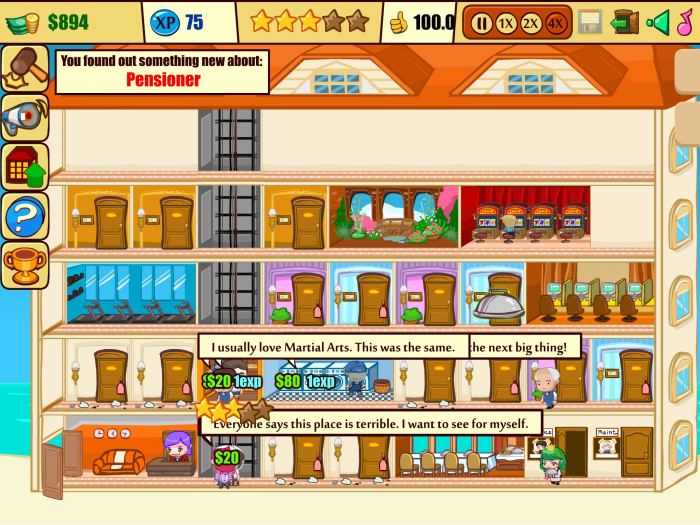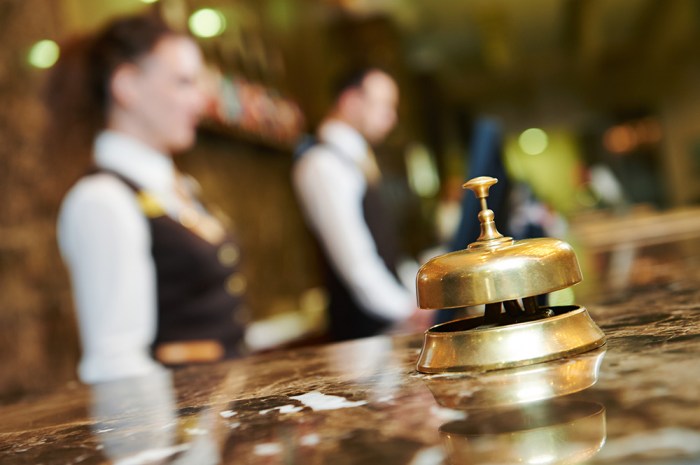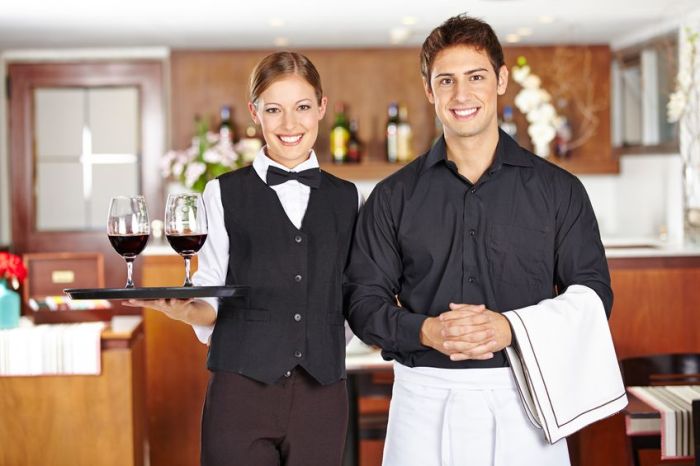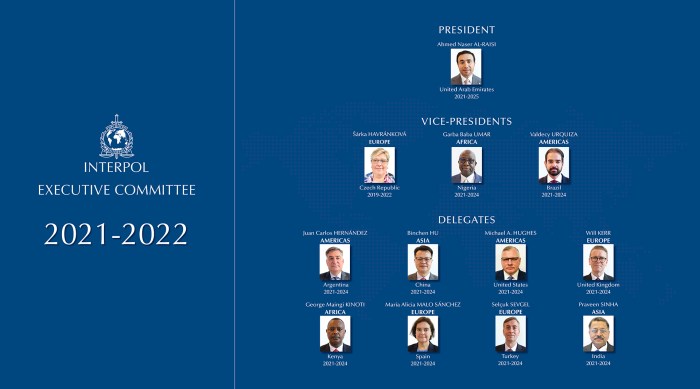Kade who manages a hotel – Kade, the hotel management maestro, orchestrates the symphony of hospitality with an unwavering commitment to excellence. From the moment guests step through the grand entrance to the time they bid farewell, Kade ensures that every experience is nothing short of extraordinary.
With a keen eye for detail and an intuitive understanding of guest needs, Kade leads a team of dedicated professionals who go above and beyond to create a haven of comfort and indulgence. Kade’s unwavering passion for the hospitality industry shines through in every aspect of the hotel’s operations, making it a destination where memories are made and cherished.
Hotel Management

As a hotel manager, Kade oversees all aspects of the hotel’s operations, ensuring the smooth functioning and profitability of the establishment.
Effective hotel management is crucial for guest satisfaction, profitability, and the overall reputation of the hotel. It involves a wide range of responsibilities, including:
- Planning and implementing hotel operations
- Managing staff and providing training
- Maintaining the hotel’s facilities and infrastructure
- Developing and implementing marketing and sales strategies
- Monitoring financial performance and implementing cost-control measures
- Ensuring compliance with industry regulations and standards
Successful hotel management strategies include:
- Providing excellent customer service
- Maintaining a clean and well-maintained hotel
- Offering competitive rates and packages
- Implementing innovative marketing and sales campaigns
- Investing in staff training and development
- Using technology to improve efficiency and guest experience
Hotel Operations

Hotel operations encompass the day-to-day activities that ensure the smooth functioning and guest satisfaction of a hotel. It involves managing various departments and coordinating their efforts to provide a seamless and memorable experience for guests.
The efficient management of hotel operations is crucial for the success of any hotel business. It requires a clear understanding of the different departments involved and their responsibilities, as well as the ability to address challenges and leverage opportunities effectively.
Kade is a busy manager at a hotel. He’s always on his toes, making sure that everything runs smoothly. But even Kade needs a break sometimes. When he does, he likes to read about oh me oh my oh meiosis . It’s a fascinating topic that helps him understand the world around him better.
And it’s a great way to relax after a long day at work.
Departments Involved in Hotel Operations
Hotel operations involve a range of departments that work together to provide a comprehensive guest experience. These departments include:
- Front Office:Responsible for guest check-in, check-out, reservations, and providing general information.
- Housekeeping:Maintains the cleanliness and presentation of guest rooms, public areas, and other hotel facilities.
- Food and Beverage:Manages all aspects of food and beverage services, including dining, room service, and banquets.
- Engineering and Maintenance:Ensures the proper functioning of all hotel equipment, facilities, and infrastructure.
- Sales and Marketing:Promotes the hotel, generates revenue, and builds relationships with customers and partners.
- Human Resources:Manages employee recruitment, training, and development.
- Finance:Handles financial transactions, budgeting, and accounting.
- Security:Ensures the safety and security of guests, staff, and property.
Guest Services

Providing excellent guest services is paramount in the hospitality industry. It directly influences guest satisfaction, loyalty, and positive word-of-mouth, which are crucial for the success of any hotel.
Enhancing guest satisfaction requires a comprehensive approach that encompasses various aspects. These include:
Personalized Experiences
- Greeting guests by name and acknowledging their preferences
- Providing tailored recommendations based on their interests
- Creating a welcoming and comfortable atmosphere
Exceptional Service, Kade who manages a hotel
- Being attentive, proactive, and responsive to guest needs
- Handling complaints promptly and effectively
- Going the extra mile to exceed expectations
Effective Communication
- Using clear and polite language
- Listening actively to guest feedback
- Providing timely updates and information
Examples of Exceptional Guest Service Experiences
Here are some examples of exceptional guest service experiences that have left a lasting impression:
- A hotel concierge who arranged a private tour of a local museum for a guest who was interested in art
- A room service staff who went out of their way to find a specific type of tea that a guest had requested
- A hotel manager who personally greeted guests and made sure their stay was as comfortable as possible
By consistently providing excellent guest services, hotels can create a loyal customer base and establish a positive reputation within the industry.
Hotel Marketing
Marketing plays a pivotal role in the success of hotels by attracting potential guests and increasing revenue. Hotels utilize various channels to reach their target audience, including online platforms, social media, and traditional advertising.
Online Marketing
Online marketing is crucial for hotels as it allows them to connect with potential guests who are actively searching for accommodation. Hotels can optimize their websites for search engines () to improve visibility and rank higher in search results. Additionally, they can utilize pay-per-click (PPC) advertising to target specific s and display ads to potential guests.
Social media marketing is also essential for hotels to engage with their audience, share content, and promote special offers.
Traditional Marketing
While online marketing is essential, traditional marketing methods still have their place in hotel marketing strategies. Hotels can advertise in print publications, such as magazines and newspapers, to reach a wider audience. They can also participate in trade shows and industry events to network with potential clients and showcase their properties.
Effective Hotel Marketing Campaigns
Successful hotel marketing campaigns often involve a combination of online and traditional marketing tactics. For example, a hotel may run a social media contest to generate excitement and increase engagement, while also running a targeted PPC campaign to drive traffic to their website.
By leveraging a mix of channels and tailoring their message to their target audience, hotels can effectively promote their properties and attract more guests.
Hotel Finance
Financial management is crucial for hotels to ensure financial stability, profitability, and long-term success. It involves planning, organizing, directing, and controlling financial resources to achieve organizational goals.
Financial Statements
Hotels use various financial statements to provide information about their financial performance and position. These include:
- Income Statement:Shows revenue, expenses, and net income over a specific period.
- Balance Sheet:Provides a snapshot of the hotel’s assets, liabilities, and equity at a specific point in time.
- Cash Flow Statement:Reports the inflow and outflow of cash and cash equivalents over a period.
Financial Analysis Techniques
Hotels use financial analysis techniques to evaluate their performance, identify trends, and make informed decisions. Common techniques include:
- Ratio Analysis:Compares different financial ratios to assess the hotel’s liquidity, solvency, profitability, and efficiency.
- Budgeting:Creates financial plans to estimate future revenue and expenses.
- Forecasting:Predicts future financial performance based on historical data and industry trends.
Hotel Technology
Technology has become an integral part of hotel management, revolutionizing the way hotels operate and interact with guests. From automated check-in to personalized room experiences, technology has brought numerous benefits to the hospitality industry.
Hotels employ a wide range of technologies, including:
- Property Management Systems (PMS): Centralized software that manages reservations, guest profiles, room availability, and billing.
- Customer Relationship Management (CRM) Systems: Tools for tracking guest preferences, managing loyalty programs, and providing personalized services.
- Mobile Applications: Guest-facing apps that allow for mobile check-in, room controls, and access to hotel amenities.
- Internet of Things (IoT) Devices: Sensors and devices that connect to the internet to monitor and control hotel systems, such as lighting, heating, and air conditioning.
- Artificial Intelligence (AI): Algorithms that analyze data to provide insights, automate tasks, and improve guest experiences.
Technology can significantly enhance hotel operations by:
- Improving efficiency: Automated processes reduce manual labor and streamline operations, freeing up staff for more personalized guest interactions.
- Enhancing guest experience: Mobile apps, personalized room controls, and AI-powered recommendations provide guests with a seamless and memorable stay.
- Optimizing revenue: PMS systems optimize room pricing, track guest preferences, and identify upselling opportunities.
- Improving sustainability: IoT devices and AI algorithms can monitor energy consumption, reduce waste, and promote environmentally friendly practices.
- Gaining insights: Data collected from technology provides valuable insights into guest behavior, preferences, and areas for improvement.
Hotel Design
Hotel design plays a pivotal role in creating a memorable guest experience and differentiating a hotel from its competitors. It encompasses various elements that collectively shape the overall ambiance, functionality, and aesthetic appeal of a hotel.
Architectural Elements
- Building Facade:The exterior of a hotel is its first impression. An eye-catching facade can attract guests and create a sense of anticipation.
- Lobby:The lobby is the central gathering space for guests. It should be spacious, inviting, and reflective of the hotel’s brand identity.
- Guest Rooms:The guest room is where guests spend most of their time. It should be comfortable, functional, and aesthetically pleasing.
Interior Design
- Color Palette:Colors can evoke emotions and create specific atmospheres. The color scheme of a hotel should align with its target market and overall brand identity.
- Furniture and Fixtures:The furniture and fixtures in a hotel should be stylish, comfortable, and durable. They should also complement the architectural elements and color palette.
- Lighting:Lighting can create different moods and enhance the overall ambiance of a hotel. It should be carefully planned to provide adequate illumination while creating a warm and inviting atmosphere.
Innovative Design Concepts
- Smart Rooms:Smart rooms use technology to enhance guest convenience and comfort. They may include features such as voice-controlled lighting, automated curtains, and in-room entertainment systems.
- Eco-Friendly Hotels:Eco-friendly hotels incorporate sustainable practices into their design. They may use recycled materials, energy-efficient appliances, and natural lighting to reduce their environmental impact.
- Themed Hotels:Themed hotels offer guests a unique and immersive experience. They may be designed around a specific theme, such as a particular historical period, a literary work, or a popular movie.
Hotel Sustainability: Kade Who Manages A Hotel

Sustainability has become an increasingly important issue for hotels, as guests become more aware of the environmental and social impact of their travel choices. By implementing sustainable practices, hotels can reduce their operating costs, attract environmentally conscious guests, and contribute to the preservation of the planet.
There are many different ways to improve hotel sustainability, including:
- Reducing energy consumptionby using energy-efficient appliances and lighting, and by implementing energy management systems.
- Conserving waterby installing low-flow fixtures and by recycling water used for irrigation.
- Reducing wasteby composting food waste, recycling materials, and using reusable products.
- Using sustainable materialsin construction and renovation, such as recycled materials and renewable energy sources.
- Supporting local communitiesby sourcing products and services from local businesses, and by providing opportunities for local employment.
Here are some examples of sustainable hotel practices:
- The Westin New York at Times Square has installed a rooftop garden that produces fresh herbs and vegetables for the hotel’s restaurant.
- The Fairmont San Francisco has a comprehensive recycling program that includes composting food waste and recycling paper, plastic, and glass.
- The Hilton San Diego Bayfront has installed solar panels that generate electricity for the hotel.
- The Ritz-Carlton, San Francisco has a partnership with a local non-profit organization to provide job training and employment opportunities for homeless individuals.
By implementing sustainable practices, hotels can make a positive impact on the environment and the community, while also improving their bottom line.
Q&A
What sets Kade apart as a hotel manager?
Kade’s exceptional leadership skills, unwavering dedication to guest satisfaction, and innovative approach to hotel management set him apart.
How does Kade ensure guest satisfaction?
Kade empowers his team to go above and beyond in meeting guest needs, creating a welcoming and memorable experience for all.
What are Kade’s key strategies for hotel operations?
Kade focuses on optimizing efficiency, maintaining high standards, and embracing technology to enhance the guest experience.
